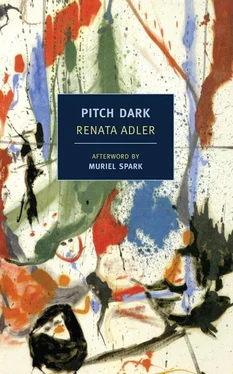Renata Adler - Pitch Dark
Здесь есть возможность читать онлайн «Renata Adler - Pitch Dark» весь текст электронной книги совершенно бесплатно (целиком полную версию без сокращений). В некоторых случаях можно слушать аудио, скачать через торрент в формате fb2 и присутствует краткое содержание. Год выпуска: 2013, Издательство: NYRB Classics, Жанр: Современная проза, на английском языке. Описание произведения, (предисловие) а так же отзывы посетителей доступны на портале библиотеки ЛибКат.
- Название:Pitch Dark
- Автор:
- Издательство:NYRB Classics
- Жанр:
- Год:2013
- ISBN:нет данных
- Рейтинг книги:3 / 5. Голосов: 1
-
Избранное:Добавить в избранное
- Отзывы:
-
Ваша оценка:
- 60
- 1
- 2
- 3
- 4
- 5
Pitch Dark: краткое содержание, описание и аннотация
Предлагаем к чтению аннотацию, описание, краткое содержание или предисловие (зависит от того, что написал сам автор книги «Pitch Dark»). Если вы не нашли необходимую информацию о книге — напишите в комментариях, мы постараемся отыскать её.
Pitch Dark Composed in the style of Renata Adler’s celebrated novel
and displaying her keen journalist’s eye and mastery of language, both simple and sublime,
is a bold and astonishing work of art.
Pitch Dark — читать онлайн бесплатно полную книгу (весь текст) целиком
Ниже представлен текст книги, разбитый по страницам. Система сохранения места последней прочитанной страницы, позволяет с удобством читать онлайн бесплатно книгу «Pitch Dark», без необходимости каждый раз заново искать на чём Вы остановились. Поставьте закладку, и сможете в любой момент перейти на страницу, на которой закончили чтение.
Интервал:
Закладка:
Well, he came to see me one night when he was drunk, bringing his dog and walking with his flashlight. We gave the dog some water, and I drove them home. He did that on several nights, over the years. Usually I heard footsteps, outside on the path, and the metallic collar of the dog.
She was going to leave him, she thought, on or about their thirty-fifth anniversary. Or, rather, his.
Bartók was what he played, Bartók and Telemann. But what moved him was Wasting Away Again in Margaritaville. What lifted his spirits one season was I’ve Got a Pair of Brand New Roller Skates, You’ve Got a Brand New Key.
When we had been in graduate school, in Cambridge, for just one year, Maggie, a friend from college, announced that she was quitting, moving elsewhere, moving on. I asked why. After all, Maggie, I said, this is Harvard, Cambridge. It’s been only a year, here we are, just two semesters. Why? “Well,” she said, “I’ve played this card now.”
This is the whole hand, so far as I know it, not played out entirely, of course. But the bridge, baccarat, double solitaire, twenty-one, old maid, hearts, blackjack, fifty-two pickup. Obviously poker. I’ve played this card now.
What do you tell the Sanger people? Lily asked. In those days, the only people who made love were these: in the colleges, stringy-haired, lonely daughters of left-wing urban parents; in the high schools, pretty girls who got pregnant and got married; in the adult world, women who, in typing, teaching, theater, publishing, art, were stymied in their jobs. The men who made love to the left-wing college girls were either medical students, who had contempt for them and forgot them, or jocks, who bragged falsely of having made conquests of quite other girls. The boys who made love to the high school girls were football stars, who settled down to families. The men who made love to women in the adult world were married men. Most children outside marriage, in those days, were conceived in drive-ins or in cars parked on country roads near reservoirs or other quiet places. The pill may have altered this pattern less radically than the proliferation, not just in sports cars but in all cars, of the bucket seat. Homosexuals may have made love in those days, but it was almost universally believed that the world included five, or at most nine, homosexuals. Brothers and sisters may have made love, but that would not have been widely known. As for married couples, there seemed to come to them, quite soon, a bitterness. What I’m trying to say is that sex among young people in those days was rare.
When you marry, the great Spanish scholar said to his seminar, late one afternoon in spring, make sure your lives are different enough so that you have something to tell each other in the evening.
Maybe he was tired of being told things. Make a joke of it, perhaps, or an epigram. But not every time, for God’s sake, not every time.
Here’s what seemed to us, in those days, at a major college, with serious feminist traditions, a daring story with an important denouement. The two professors were legendary, Dr. Vickers, Miss Collins. They had refused to marry, in the early nineteen-twenties, when the president of the college had insisted that they must. They had been anarchists, living together in a cottage some miles from the campus. Anarchists with principle. Anarchists with tenure. Anarchists in love. There was no certainty that the college president, or even the entire faculty, could dismiss them. The issues were profound: traditions of the community of scholars and independence; traditions of in loco parentis and the middle class. One evening, in the second autumn of this quiet scandal, the college president drove her Packard to the cottage. An early suffragette and a lifelong spinster, she spoke to them by their first names. Rufus, she said, Amanda, this cannot go on. Certain standards must prevail. She asked them, for God’s sake, for her sake, for all their sakes, to marry. Dr. Vickers asked her to sit down, and told her that they had in fact been married since last May. The three old friends had sherry and got drunk together. But for all time, from the twenties onward, the couple, both historians, were known as Dr. Vickers and Miss Collins, and treated as unmarried, as though their respectability were an embarrassing secret, and their intractability of many years a source of pride.
One morning in the late fifties, Bonnie Stone, an academically and socially ambitious senior from New York, who often overslept, or overate, or overdressed, but who relied in crisis on a certain flirting charm, was late for an appointment with Dr. Vickers. In fact, it seemed she might have missed it altogether. They stood, that afternoon, in the library corridor outside his office. Bonnie was explaining, loudly, volubly, elaborately, with an expression of perhaps too intense apology. “Don’t worry, sweetie,” the old professor said at last. “I’ve been stood up by better-looking broads than you.” Apart from a remark by a lecturer, untenured, concerning speculation about Byron and his sister — a remark so daring in its cavalierness and obscenity that no two versions agreed as to exactly what it was—“Don’t worry, sweetie. I’ve been stood up by better-looking broads than you,” were the most shocking sentences, within the academic setting, that any of us had ever heard.
The world is everything that is the case.
And in the second place because.
Did I throw the most important thing perhaps, by accident, away?
Here’s how I know that I’ve already lost him. Jake is driving. I am in mid-sentence, or mid-anecdote, or halfway through a question. Though it’s neither the hour nor the half hour, he flips on the radio news. I know I’ve lost him then, because I have. And yet, at five on a cold and snowy morning, Jake had picked me up for the long drive to the city. Cars were few. It was still dark. With the radio on, he talked. He pointed to a place where, he said, on the road to my house, he had seen two deer. That was all he said. A few nights later, we went to a party, at about an hour’s distance from our town. Jake and his wife had picked me up for the drive there. His idea. I have my own car. Late that night, on the road back, he said, “Honey, right there in that heavy snowstorm, I saw two deer.” There was a silence. I thought, he calls her honey. I could not imagine what his wife thought, or why she said nothing, or why the silence seemed so long and deep. His words were clearly not addressed to me. He had already told me about the deer. He has never called me anything but Kate. Then it dawned on me. He had told his wife, too, and forgotten that he’d told her. She must have thought he was telling me for the first time, and that, whatever honey has come to mean between them, he now calls me that. I could be wrong, of course. She may not even have been listening, or maybe she never answers at that hour. There we both were, though, together in our silence. There he was, a little drunk, unaware, I think, and happy, driving through the darkness down the road.
Crying was not, was by no means, her modus operandi. Nonetheless, she wept.
In the sixth year, I went to New Orleans by myself.
How could I know that every time you had a choice you would choose the other thing?
This is about the wildlife commissioner. And the houseguest, an animal. Henry James would have known what to do with him. Flannery O’Connor would have dealt with him in her way. New England environmentalist writers would have wrung from him whatever can be wrung from the birth of their meaningful foals in dark hours or from symbolic encroachments by highways on family meadows. For Conrad, perhaps, it might have been a man. But it was not a man, this creature with which I had a misunderstanding. It wandered, late one afternoon in winter, into the small room, almost a closet, which contained a stove, in the old barn where I used to live. The weather was grey, a few snowflakes fell. It was very cold. I sat in a shabby armchair, reading. I felt watched. When I looked up, I saw the animal, with delicate paws, a sharp face, and high, arched fluffy tail, sitting up, staring at me, through the open doorway, from a place beside the stove. A moment later, he vanished. I thought I might have imagined him. After a while, I went to look. There was some reddish fluff, in a narrow gap between the insulation and the wall. I had switched on a small lightbulb, which hung from the ceiling. I left it on, then closed and, to my surprise and half-smilingly, locked the door between that room and my own. I did not fall asleep until very late.
Читать дальшеИнтервал:
Закладка:
Похожие книги на «Pitch Dark»
Представляем Вашему вниманию похожие книги на «Pitch Dark» списком для выбора. Мы отобрали схожую по названию и смыслу литературу в надежде предоставить читателям больше вариантов отыскать новые, интересные, ещё непрочитанные произведения.
Обсуждение, отзывы о книге «Pitch Dark» и просто собственные мнения читателей. Оставьте ваши комментарии, напишите, что Вы думаете о произведении, его смысле или главных героях. Укажите что конкретно понравилось, а что нет, и почему Вы так считаете.












